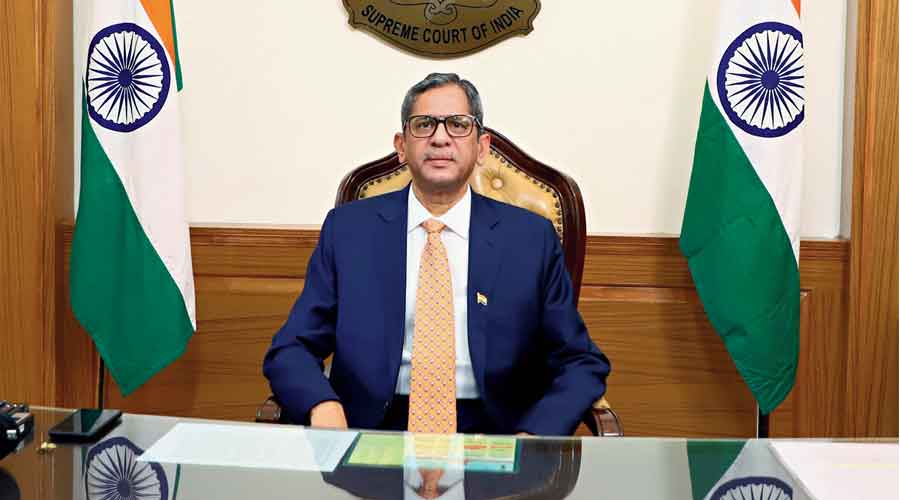Chief Justice of India N.V. Ramana on Saturday called for the implementation of regional languages in high courts to make the litigation process more inclusive.
Currently, English is the medium used for arguments, pleadings and submissions in all high courts as chief justices are invariably appointed from outside the state.
However, regional leaders have often demanded the use of local language in high courts to make it easy for the common man to understand the justice-delivery system.
“The parties must understand the ongoing court process and the development of their case. It should not be like chanting mantras in a wedding, which most of us do not understand. From time to time, there have been demands from various regions to allow the use of local language in the proceedings before the high courts as provided for under Article 348 of the Constitution,” Justice Ramana said.
He said there were certain barriers that had prevented local languages from being adopted in high courts.
“I am sure, with innovation in science and technology, and advancements such as artificial intelligence, some of the issues… may be solved in the near future,” Justice Ramana added.
Addressing a gathering after laying the foundation stone for an additional complex of Madras High Court, the CJI said the practice of law before constitutional courts should be based on one’s intelligence and understanding of law and not mere proficiency in language.
“It is time for some decision to be taken on this issue, after assessment of the pros and cons. Inclusivity is one of the most important dimensions of Indianisation. Any profession having representation from all classes and sections will be beneficial to all,” he said.
Referring to the frequent demands from non-northern states to set up regional benches of the Supreme Court, the CJI said social and geographical diversity of the nation must find reflection at all levels of the judiciary.
Justice Ramana pointed out that Tamil Nadu MP P.Wilson had introduced a private member’s bill in Parliament to enable the setting up of regional benches of the Supreme Court.
“I am not aware if the government of India has expressed its views on this subject. But, in the same spirit of accessibility, I have continued with online hearing for miscellaneous days, which we had started during the pandemic.
“On non-miscellaneous days, advocates can still seek the permission of the court to appear online. This is to enable advocates from all over the country to continue their practice before the Supreme Court. I hope this practice continues and is further strengthened in the future,” Justice Ramana told the gathering which included Supreme Court judges.
The CJI said the biggest issue affecting all institutions nowadays, including the judiciary, was ensuring sustained faith in the eyes of the public.
“We have the duty of upholding and enforcing the constitutional values. It is, no doubt, a heavy burden. But it is one that we have gladly chosen on the day we took our constitutional oath. This is the reason why strengthening judicial institutions has been my top priority. Strengthening the judiciary is imperative for a democracy, sustained on the rule of law. Dispensing justice is not only a constitutional duty, but also a social one,” Justice Ramana said.
The CJI said the judicial infrastructure ought to be fortified to deliver justice to people more quickly, but cautioned against instant justice.
“The world is moving very fast. We are witnessing this change in every sphere of life. From five-day test match we have moved on to 20-20 format. We prefer short duration entertainment over a 3-hour long movie. From filter coffee, we have moved on to instant coffee. In this era of instant noodles, people expect instant justice. But they do not realise that real justice will be a casualty if we strive for instant justice,” Justice Ramana said.
The CJI said it was necessary to reduce the caseload per judge and improve the judge-to-population ratio.
As of Saturday, there are 388 vacancies against 1,104 sanctioned posts of high court judges.
The CJI said there had been considerable progress in the filling up of the judicial vacancies.
“After I assumed office, we made 180 recommendations so far, for appointments in high courts. Out of this, 126 appointments were made. 54 proposals are awaiting approval by the government. The government has received nearly 100 proposals from various high courts, which are yet to be transmitted to Supreme Court. I am hoping that the high courts will expedite the process of sending the proposals to fill the remaining 212 vacancies,” he added.










